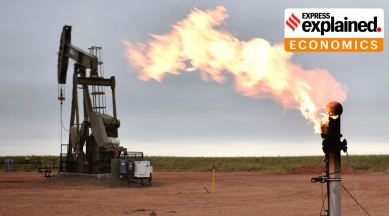Explained: The impact of Biden’s ban on Russian oil — in Moscow, Washington, Caracas, and Tehran
President Joe Biden has announced a total ban on American imports of Russian oil and gas. The immediate impact will be seen in the higher price of auto fuels for Americans. Biden was upfront about this in his address: “Defending freedom is going to cost”, he said.

President Joe Biden has announced a total ban on American imports of Russian oil and gas. How will his decision, taken with apparently bipartisan support in the United States, impact Russia and the ordinary American? And how can it change the US relationship with other oil-producing regimes that it has demonised for years?
How will the US ban on Russian oil imports impact Russia?
No significant impact is likely, at least directly and in the short term.
monthly limit of free stories.
with an Express account.
In 2021, America got only about 8% of its oil and petroleum products imports from Russia. That worked out to about 245 million barrels for the year, or around 672,000 barrels a day.
This is a fairly modest amount, and Moscow can conceivably make up the loss of American business by selling to China or even India. Because of the smaller pool of potential customers though, it might have to offer significant discounts.
In fact, even before the announcement of sanctions, some American refiners had started to cut off Russian supplies. An Associated Press (AP) report said imports of Russian crude had dropped to zero in the last week of February, quoting preliminary data from the US Department of Energy.
Russia does not sell any natural gas to the US. Overall, the impact of the ban on Russia would be “minimal”, the AP said.
And how will the United States and Americans be impacted?
The immediate impact will be seen in the higher price of auto fuels for Americans. Biden was upfront about this in his address: “Defending freedom is going to cost”, he said.
The national average price for a gallon (about 3.8 litres) of regular gasoline (petrol), was $4.173 on March 8, up from $4.06 on March 7, according to the American Automobile Association (AAA) which tracks prices daily.
The March 7 price was itself 45 cents more than the price a week ago, 62 cents more than a month ago, and $1.30 more than a year ago, the AAA said in a release. The US national average has not been this high since July 2008, the AAA said.
The New York Times quoted Omair Sharif, founder of Inflation Insights, as saying the national average gas price could touch nearly $4.50 this month, “assuming we don’t move any more”. The AP report said the price could go past $5 per gallon, should international crude prices touch $160 a barrel or go even higher up to $200.
(For a rough comparison with India, the price per gallon is now about Rs 362, or Rs 95 for a litre of petrol as per the exchange rate on Wednesday, which is about the same as what Indians are paying at pumps.)
Not only have Russian oil, LNG, and coal imports been stopped, all new American investments in Russia’s energy sector are also banned. Nor can Americans put money in any foreign companies that make investments in Russian energy production.
The ban, and higher pump prices, are widely expected to increase overall inflation in the US. According to the US Bureau of Labour Statistics, inflation in January was at a 40-year high, and prices were up 7.5 per cent from a year ago.
How will the global shortfall in production arising out of this situation be addressed?
Biden said that “If we do not respond to Putin’s assault on global peace and stability today, the cost of freedom and to the American people will be even greater tomorrow”, and promised to “do everything I can to minimize Putin’s price hike here at home”.
Some Republicans have been urging that the US should increase the domestic production of oil. That, however, is a long-term idea, and will not address the immediate problem. It will also involve a debate on the US commitments to protecting the environment and various other complex questions.
In the short term, countries such as Iran and Venezuela, long condemned by the US and other Western governments as “rogue” regimes, are likely to be “welcomed back” into the oil market, the AP report quoted Claudio Galimberti, an analyst at Rystad Energy, as saying.
A team of American officials travelled to Caracas over last weekend to discuss energy and “other issues”, the White House said. Venezuela, one of the world’s leading producers of oil, and a classic petro-state, is Russia’s closest ally in South America.
Following the talks, Venezuela on Tuesday released two jailed US citizens, including an oil executive who was arrested in 2017 on allegations of corruption. Analysts were reading this as a peace signal by President Nicolas Maduro, who had earlier indicated in a televised address to his people that he was amenable to accepting US demands that he re-open talks with political opponents of his regime, which the US considers illegitimate.
The US has also been in negotiations with Tehran to revive the 2015 nuclear deal that President Donald Trump’s administration had abandoned, in return for easing Western sanctions. A Reuters report on March 7 quoted the Iranian foreign ministry spokesperson Saeed Khatibzadeh as saying that a deal can be reached in “the shortest time” if the US accepts some conditions put by Tehran.
Newsletter | Click to get the day’s best explainers in your inbox